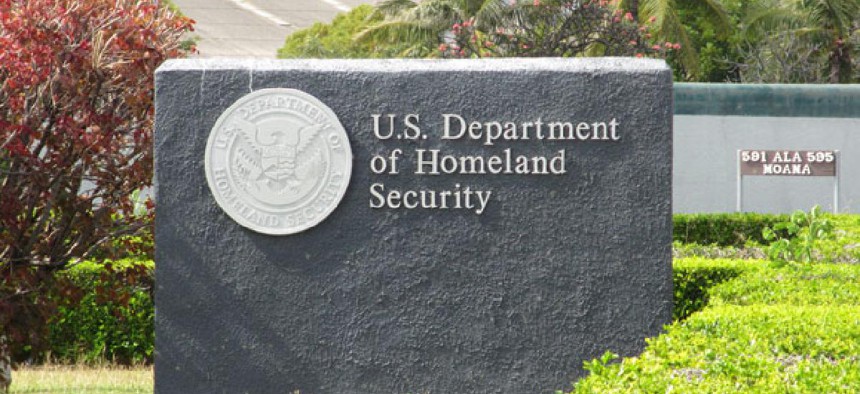
A sign directs visitors to a Homeland Security office in Hawaii. Flickr user ericbvd
Homeland Security counsel defends department’s progress
DHS criticized for waste, unclear mission on 10th anniversary.
As it marks its 10th anniversary, the Homeland Security Department has made progress with “smart programs” by moving away from “one-size-fits-all solutions toward common-sense ones,” a top DHS official said Wednesday.
Seth Grossman, DHS deputy general counsel, said the Obama administration “inherited a very new department,” that was “still but organizing itself in how to work across the federal government and with states and localities.”
Speaking on a panel of frequent DHS critics sponsored jointly by the American Constitution Society and the Open Society Foundation, Grossman cited as an example of solid solutions the decision to abandon a full security fence on the southern U.S. border with Mexico. “We recognized that places differ by terrain and population density, so we used technology [selectively and] border security is at the highest level in 50 years.”
He also praised the Transportation Security Administration’s embrace of risk-based airport passenger screening, the PreCheck program. And he cited efforts by the Immigration and Customs Enforcement bureau to prioritize budgetary resources in enforcing immigration law, focusing on suspects with recent criminal convictions, those who recently crossed the border, and those with past immigration law violations. Immigration courts, similarly, have identified high-priority cases and postponed low-priority ones, such as those involving deferred action for childhood arrivals. “We can improve, but we’ve done a lot in four years,” Grossman said.
Criticism of DHS came from Michael German, senior policy counsel for the American Civil Liberties Union, who said when first stood up, the department “struggled in an environment filled with intelligence agencies to find an area where they could be helpful. But rather than take their time, they rushed in to do something and not something effective.”
German was particularly tough on the DHS fusion centers, the 77 facilities nationwide that seek to synthesize and share intelligence on threats from violent crime, terrorism and natural disasters. He cited a slew of recent reports calling them wasteful and risky. “If information sharing intelligence is not timely, is erroneous or it violates people’s rights,” it’s not helpful, he said. German said he would like to see DHS use its size to influence intelligence agencies on avoiding bias against dissident groups and violations of civil and privacy rights.
Jamil Jaffer, senior counsel at the House Permanent Select Committee on Intelligence, said DHS’ lead role in U.S. cybersecurity strategy is “controversial on Capitol Hill -- they wonder whether the department has the capability and can roll it out quickly.” Noting that cybersecurity reform legislation has cleared the House but stalled in the Senate, he expressed concern that some private sector companies, whose cooperation is crucial to any cyber strategy, have been dropping out of a pilot program for protecting the defense industrial base, apparently because they preferred working with the Defense Department. Who should run the cyber strategy “is an open question,” Jaffer said. “We’re hopeful for a middle ground.”
Wendy Patten, senior policy analyst with the Open Society Foundation, said immigration activists back in 2002 were concerned when the reorganization “collapsed” the immigration and border control functions into a homeland security framework. “It made it harder to address the history of humanitarian concerns, such as refugees and victims of domestic violence,” she said. She, too, was concerned about fusion centers for “casting a wide net” in targeting communities. “They’re not as effective as good old-fashioned law enforcement rolling up its sleeves,” Patten said.
By contrast, she said the DHS Office for Civil Rights and Civil Liberties “has done a good job responding to concerns” about oversight and has been effective in engaging immigrant families. She said she hoped it would have more input “upfront, in a preventive way,” given the department’s inspector general tends to investigate problems “after the fact.”
Grossman replied that Margo Schlanger, DHS’ officer for civil rights and civil liberties, “is engaged in policies at all stages with all stakeholders,” as is the Public Advocate’s Office at ICE, which “gives feedback to leaders on policy in a two-way communication.”
The fusion centers are controversial, he added, but many lawmakers have disavowed some of the criticism and “the department has done a good job developing them and trying to improve them.”
The advantages of having what once were 22 agencies under one roof, Grossman said, were in evidence during the aftermath of the 2010 earthquake in Haiti, for which ICE, the Coast Guard, and the Federal Emergency Management Agency “enabled the United States to play an active and robust coordinating role.” Weighing costs and benefits of consolidation, he added, also allows a rationalization of policies in such areas as ICE and Border Patrol handling of intellectual property enforcement.
Homeland Security’s ability to work in a system of federalism with state and local authorities was demonstrated, he said, in FEMA’s recent response to Hurricane Sandy.







